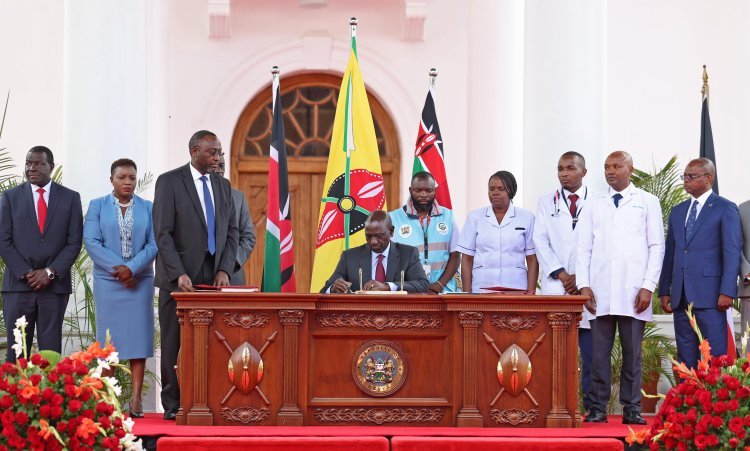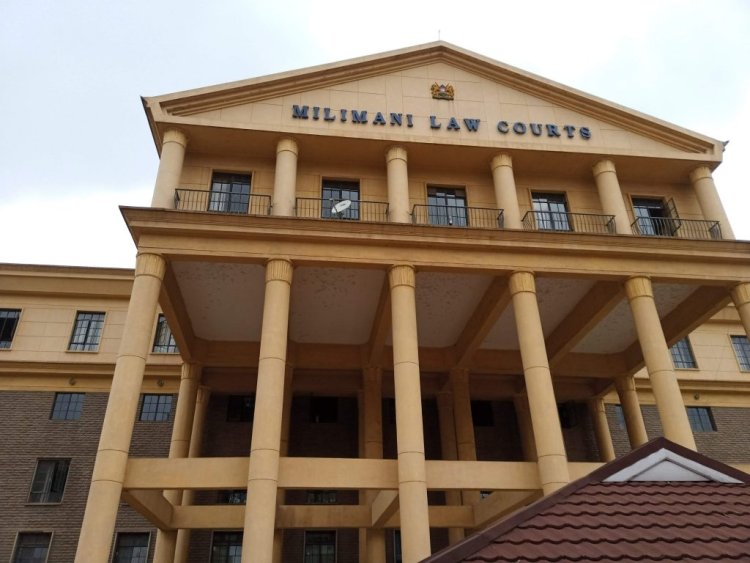Ruto's Social Health Insurance Act Suspended Until 2024
The Act which includes the following bills: The Social Health Insurance, Primary Health Care Act, and the Digital and Digital Health Act, was suspended until February 7, 2024.

The High Court has suspended the planned implementation of the Social Health Insurance Act 2023 and other related Acts by the Ministry of Health after three bills on the same were signed by President William Ruto.
The Act which includes the following bills: The Social Health Insurance, Primary Health Care Act, and the Digital and Digital Health Act, was suspended until February 7, 2024.
In a brief ruling rendered by Justice Chacha Mwita on Monday, November 27, the court temporarily barred the state from effecting the three new funds gazetted by Health Cabinet Secretary (CS) Susan Nakhumicha pending the determination of a case lodged in court by activist Joseph Enock.
"A conservatory order is hereby issued restraining the respondents (President William Ruto, CSs in the Ministry of Health and Information, the Attorney General, Commission for Revenue Collection, The National Assembly and the Senate), their agents and or anyone acting on their directives from implementing and or enforcing The Social Health Insurance Act,2023; The Primary Health Care Act, 2023 and the Digital Health Act,2023 until February 7, 2024," Justice Mwita ordered.

Outside the Milimani Law Courts. /FILE
Enock had, through his lawyer, Harrison Kinyanjui, argued that the Social Health Insurance Act 2023 is unconstitutional since the Executive usurped the role of the Parliament when enacting the new law.
He argued that there was no proper public participation before the said acts law was enacted.
"In violation of Article 7(1) of the Constitution of Kenya, none of the purported "public participation" engagements by either National Assembly or the Senate were conducted or executed in the Kiswahili language in respect of the Social Health Insurance Fund Act, 2023, or the Digital Health Act, 2023, or the Primary Health Care Act, 2023. The said Acts are to the said extent null and void," Kinyanjui told the Judge.
Kenya Medical Practitioners, Pharmacists & Dentists Union (KMPDU) also moved to court to have the Act suspended as it poses a threat to the larger health industry.
Justice Mwita ordered the Ministry of Health to issue a response to the petition within 7 days after which they will have another 7 days of filing and serving supplementary affidavits to the petition.
The ministry will then have another 7 days to file and serve written submissions to the petition that should not exceed 10 pages.
The signing of the bills took place at State House during a publicised event held at its courtyard, a notable shift from the bill signing events which take place indoors in closed-door events.
The publicising of the signing of the bills, which was also televised, carried a major significance given that it came a day before Mashujaa Day on Friday, October 20 in Kericho County.
President Ruto who spoke after the signing of the bills, remarked that the country has made a huge step towards transforming its healthcare system.
“Today we have made a significant step towards making healthcare universal for all Kenyans. I thank and commend the people of Kenya for actively shaping these laws through various public engagement platforms," stated Ruto.
It is perhaps the Social Health Insurance Bill that carried the most significance since this is the one that abolished the National Health Insurance Fund (NHIF) officially for the first time since 1966.
By revoking NHIF and replacing it, President Ruto seeks to attain Universal Health Coverage (UHC) as set out within his plan for a healthier nation espoused under the Bottom Up Economic Transformation Agenda (BETA).
In place of NHIF, Ruto created three funds namely Primary Health Care Fund, Social Health Insurance Fund, and Chronic Illness and Emergency Fund.
The Social Health Bill was to enable all Kenyans to access quality care, regardless of their financial status. Kenyans employed in the formal sector were to make a monthly contribution of 2.75 per cent of their salary capped at a minimum of Ksh300 and a maximum of Ksh5,000.
The SHI Act also stipulates that all non-Kenyans who reside in the country will be eligible for registration as members of the Fund. This applies to a non-Kenyan resident ordinarily residing in Kenya for a period exceeding 12 months.
However, a non-Kenyan who intends to enter and remain in the country for less than 12 months will be required to have travel health insurance coverage.
To ensure punitive measures to curtail corruption are instituted, those suspected of defrauding the health insurance scheme, through false statements risk being jailed for five years or fined Ksh1 million or both.
The NHIF had been required to transfer all the cash balances to the Social Health Insurance Fund.


 admin
admin 




